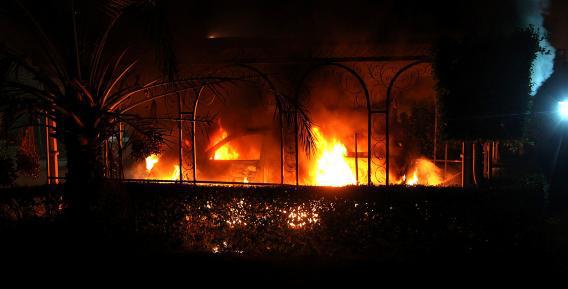Ex-CIA Director David Petraeus made his way to Capitol Hill today to brief lawmakers behind closed-doors on the attack on the U.S. consulate in Benghazi. Because the hearing was a private one, the press will have to rely exclusively on second-hand accounts from those in the room, ensuring that the picture of what was said is a blurry one at best.
Still, one big takeaway appears to already be emerging: Petraeus apparently told lawmakers that he and the rest of the CIA brass quickly determined that the Sept. 11 attack was the work of terrorists. The reason that view wasn’t relayed to the American public in the immediate wake of the attack, however, was because somewhere along the chain of command the terrorism talking points were left on the cutting room floor.
The Associated Press with the details:
Lawmakers said Petraeus testified that the CIA’s talking points written in response to the assault on the diplomat post in Benghazi that killed four Americans referred to it as a terrorist attack. But Petraeus told the lawmakers it was removed by other federal agencies who made changes to the CIA’s draft.
Rep. Peter King, R-N.Y., said Petraeus said he did not know who removed the reference to terrorism. King said to this day it’s still not clear how the final talking points emerged that were used by U.N. Ambassador Susan Rice five days after the attack when the White House sent her to appear in a series of television interviews. Rice said it appeared the attack was sparked by a spontaneous protest over an anti-Muslim video.
Rep. Adam Schiff, D-Calif., said Petraeus disputed Republican suggestions that the White House misled the public on what led to the violence in the midst of President Barack Obama’s re-election campaign.
How lawmakers view Petraeus’ disclosure, of course, likely depends on what side of the aisle they’re on. Republicans have repeatedly blasted the White House for what they say was a failure to immediately draw a connection between the assassination of an American ambassador and al-Qaida. Democrats, meanwhile, contend that the administration was simply trying to avoid making concrete assertions until all the facts were in.
